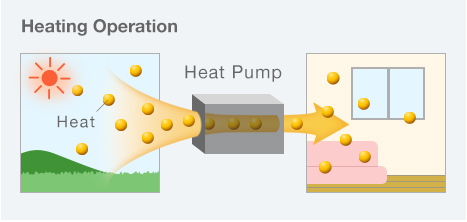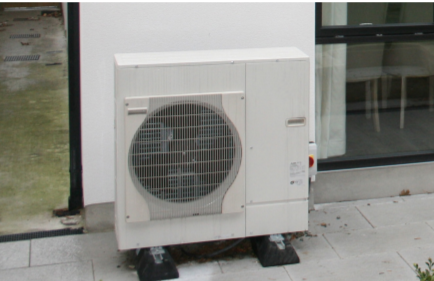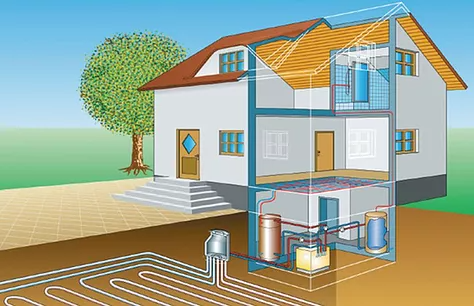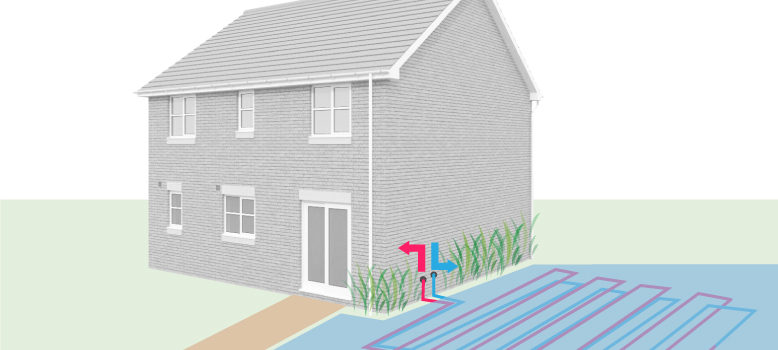Discover More
Heat Pumps
Energy Efficiency Week 2021 / Monday
Level 3: Get ready to move to renewable heating – heat pumps
Heat pumps are a great, energy efficient choice for heating your home. As well as being low maintenance, they reduce your heating costs and lower your carbon footprint.
So how do you know if one is right for you and your home? Here are some helpful facts about heat pumps so you can decide if it’s the right choice for you.
 |
Will you be getting ready to move on to renewable heating? |
A heat pump replaces your conventional boiler and harnesses a renewable form of energy in the environment.. It is not a new technology but is basically a fridge working in reverse. It collects a small amount of low-grade heat in the air, water or earth and concentrates it with the use of a refrigerant to create useful temperatures to heat our homes.
What are the benefits of a heat pump?
- They are cheaper to run than a boiler
- They are much more efficient than a boiler
- They are considered a renewable energy and can be 100% carbon neutral to run when the electricity supplied is from a green source
- No fuel storage required
- Can be used for heating and cooling depending on the type of heat pump
- Long lifespan, up to 20 years
- Will help avoid the increasing carbon tax
What are the negatives of a heat pump?
- They require a well-insulated house to run which can be prohibitive
- They can be expensive to install depending on the set up of the dwelling
- They produce a lower heat than a boiler
- They are a bit noisier than a boiler to run (comparable to an air conditioner)
Are there grants to buy a heat pump?
- Yes, there are grants to buy a heat pump of up to €3,500
- The SEAI organise and manage the grants
Who are the grants available to?
- All homeowners, including landlords, whose homes were built and occupied before 2011 can apply
Where do I find information on the grants?
Please see the link here
https://www.seai.ie/grants/home-energy-grants/heat-pump-systems/
Are there different types of heat pumps?
The type of heat pump refers to the initial heat source for the pump. The type of heat pump will be greatly influenced by where you live. Ground source heat pumps require larger areas of land to function, water source heat pumps need a body of water nearby (ground water can be utilised depending on the location).
- Air source heat pumps
- This is the most common type. It is the easiest to install and has the smallest footprint. It is also the least expensive.

- Ground source heat pumps
- Requires a larger area than air to water, is more expensive but more efficient. Second most bought heat pump but a distant second.

- Water source heat pumps
- Requires nearby lakes, river or stream to run, mostly found in the countryside.

Can a heat pump directly replace my boiler?
Although heat pumps are a direct replacement for your boiler they do not run exactly like your boiler. A heat pump produces lower grade heat than a boiler. Typically, a boiler will run on somewhere from 65 – 80°C. Whereas a heat pump produces low temperatures that run for a longer time circa 45°C.
What does this mean?
Largely this means two things
- The distribution system of the heat pump must be suitable to allow the heat out at a slower rate. Radiators must be sized correctly; they will usually be bigger than radiators sized for a boiler for instance. Underfloor heating is suitable as it is a large mass to distribute the low temperatures better.
- The house must be well insulated and not be too porous. Heat will escape through the walls but also via air which will carry heat with it as it leaves the property. If the property does not lose the heat too readily the heat pump can work more efficiently and save you more.
What are the steps to getting a grant to a heat pump?
To qualify for a grant, your home must meet specific energy efficiency standards. A technical assessment of your home will be undertaken by an authorised assessor. The assessor will determine a Heat Loss Indicator for your specific installation before anything can proceed.
A dedicated technical advisor will be assigned to through the SEAI to help you with all aspects of this.
Full details of this can be found here
https://www.seai.ie/publications/Technical_Advisor_Role.pdf
What if I don’t qualify for a grant for a heat pump?
If you do not meet the criteria for a grant award, an SEAI approved technical advisor will provide a pathway through fabric upgrades of the home.
Funding and grants are made available by the SEAI.
What are the costs of running a heat pump?
The following is taken from the Heat pump association of Ireland as an example of the cost of running a heat pump in Ireland.
- A house using 25,000 kWh(units of energy) of energy – on home heating oil would cost €2682.00 per year to heat versus €945.00 for the heat pump, This is an annual saving of €1737.00
How much does a heat pump cost?
Heat pump prices vary according to the type or heat pump, size of the dwelling, heat requirements, installation requirements and cost of materials on the market at the time of install.
A typical heat pump air to water has been estimated to cost between €8,500 – €14,500.
A typical ground source system has been estimated at €12,500 – €23,500
Assuming the savings figure above from the Heat Pump Association of Ireland of €1737 per year would allow a payback of
- Air source heat pump for €14,500 payback of 8.4 years
- Ground source heat pump €23,500 payback of 13.5 years
Are there hidden costs with buying a heat pump?
There may be extra costs in preparing a home to be eligible for a heat pump. This may include a combination of the following(bear in mind that there are also grants available for most of these items).
- Insulation of the loft, walls,, and floor
- Replacing or repairing windows and doors
- Improving the air tightness of the dwelling
- New pipework and radiators
Will you be getting ready to move on to renewable heating?
Privacy Overview
| Cookie | Duration | Description |
|---|---|---|
| cookielawinfo-checbox-analytics | 11 months | This cookie is set by GDPR Cookie Consent plugin. The cookie is used to store the user consent for the cookies in the category "Analytics". |
| cookielawinfo-checbox-functional | 11 months | The cookie is set by GDPR cookie consent to record the user consent for the cookies in the category "Functional". |
| cookielawinfo-checbox-others | 11 months | This cookie is set by GDPR Cookie Consent plugin. The cookie is used to store the user consent for the cookies in the category "Other. |
| cookielawinfo-checkbox-necessary | 11 months | This cookie is set by GDPR Cookie Consent plugin. The cookies is used to store the user consent for the cookies in the category "Necessary". |
| cookielawinfo-checkbox-performance | 11 months | This cookie is set by GDPR Cookie Consent plugin. The cookie is used to store the user consent for the cookies in the category "Performance". |
| viewed_cookie_policy | 11 months | The cookie is set by the GDPR Cookie Consent plugin and is used to store whether or not user has consented to the use of cookies. It does not store any personal data. |



